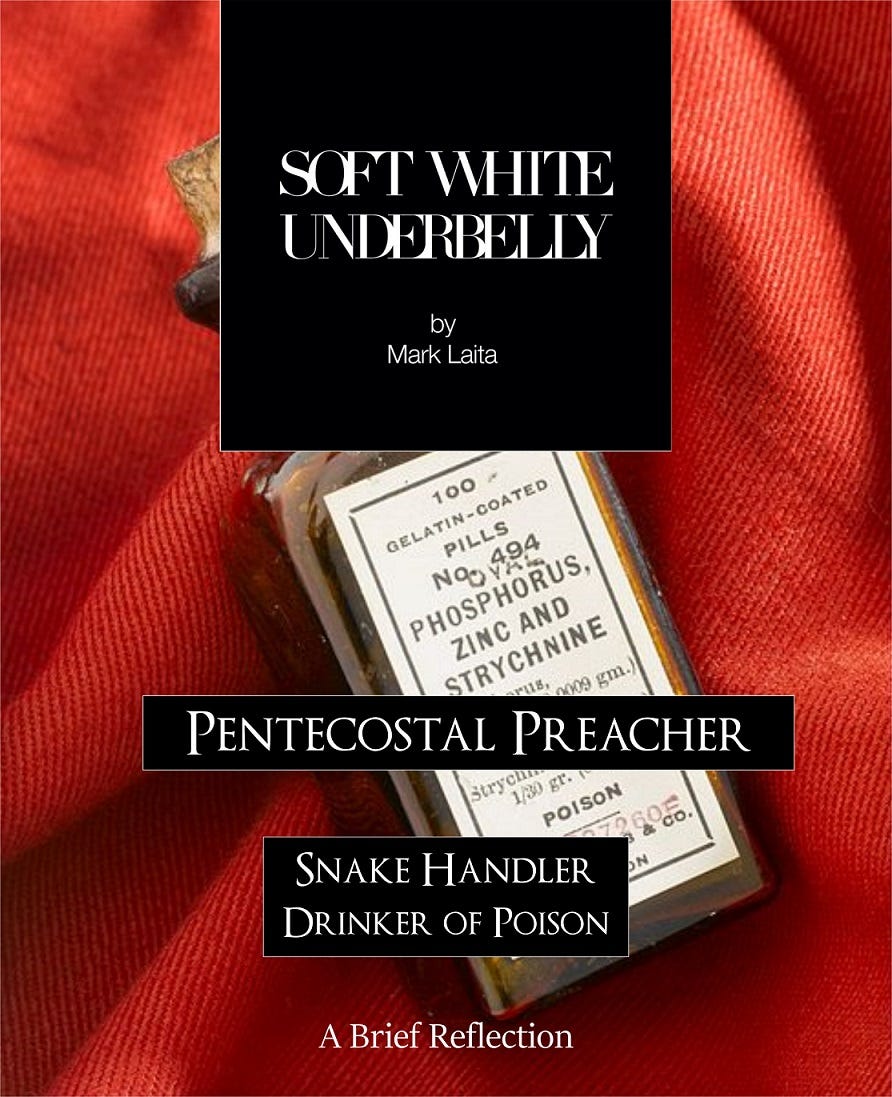SOFT WHITE UNDERBELLY: A Brief Reflection on a Pentecostal Snake Handler

The following reflection is based upon this fascinating and heartbreaking video by Mark Latia.
Never have I felt so conflicted about a man’s faith as when I listened to Pastor Wolford talk about his trust in God while handling venomous snakes.
On the one hand, the sheer simplicity of his unwavering trust hails from some impressive quadrant of childlike obedience, the likes of which may very well make a mockery of my own reliance upon God. On the other hand, the sheer unsophistication of his backwoods approach combines into what can only be described as a deadly foolish ignorance.
All this is to say, I feel deeply torn about this misguided man. He’s sincere, principled, gracious. Unless I am woefully misreading him, that seems to be a fair conclusion (based on this video alone, I might hasten to add). But then again, and to keep stressing the bizarre juxtapositions that arise out of him, he is woefully misinformed, doctrinally dangerous, unfit.
Having watched the video twice, one of the things I can’t stop thinking about is the precarious nature of human trust, belief, and conviction. I have in mind the fragility of human knowledge and how easily we embrace hogwash. From an evidential standpoint, this should be the most obvious thing in the world. Just look around. Bad ideas, among both the religious and the secular, proliferate as commonly as dandelions in springtime.
We latch on to some strange belief, or axiom, or article of faith and begin to dance with it. It’s then slotted into a larger system of thought, which either energizes it or grants it credence. This makes what would otherwise be thought absurd suddenly rational in some dim way. This is because faith is a virtue and trust is an inescapable feature of life. We all have to plant our epistemological feet on something.
So far as I can tell, all of us are continually struggling along a continuum. On the far left, there is a kind of open-mindedness that descends into pure credulity. But on the other side, there is a form of strident dogmatism that is so self-assured, so close-minded, and so arrogantly confident that no glimmer of humility can be found within.
I’m sure you’ve met people who embody one or the other. And if you’re like me, you have experience playing each role.
In my darkest moments, I fear we are all locked in a prison of ignorance and credulity. The sheer volume of opinions, online chatter, and finely-tuned ideologies can utterly confound the pilgrim seeking to weave his way through this maze of human thought. We just aren’t that smart. We’re finite creatures—and sinful ones at that.
In this respect, one can almost appreciate the simplicity of this pastor’s faith. He has taken a stand on a very simple idea—even when critics abound and loved ones die.
But he’s wrong. Profoundly so. And so in the end, it isn’t a glorious kind of trust. It is a misguided form of faith that deserves to be sharply rebuked.
How we navigate this continuum requires a lifetime of wisdom. I don’t pretend to have it figured out. But one of the things that stands out to me is that in order for us to have any hope whatsoever of finding the Light, the Light has to first shine down upon us in this dark dungeon. The sheer mendacity and folly of mankind necessitate it. One might say, therefore, that the Light has to evidence itself all around us (Romans 1:18ff), and that the Light has to shine in our hearts (2 Cor 4:3-6). Indeed, the very Light itself has to tabernacle among us (John 1:1-14) if we are to have any real hope of escaping the darkness.
Once this key epistemological problem is bridged through Christ, we are tasked with developing a wide array of biblical convictions. Here, there are no trite solutions or simplistic steps. The challenge of avoiding weirdness and error runs as deep as our upbringing, circumstances, character, and brains. It has everything to do with what we read (or don’t read), the degree of humble inquiry we’re willing to develop (or not), the extent to which we pursue wisdom (or not), and how closely we walk in step with the Spirit, bearing fruit in concert with a lively faith (or not).
And so on and so forth.
There’s an intersection where faith and ignorance collide in a nuclear explosion of misplaced zeal and foolishness. I believe we see it in this video. But of course, such foolishness extends far beyond the practices of snake handling. My sincere question, which is as much pointed at myself as anyone else, is: Where is the “snake handling” in your life, and what are you doing to root it out?
It is often so easy to see the folly in other people’s lives, but so profoundly difficult to see it in our own. Oh, to have eyes to see and ears to hear what lumpy, theological oddity might be flopping awkwardly about in the contours of my thinking.
The post SOFT WHITE UNDERBELLY: A Brief Reflection on a Pentecostal Snake Handler appeared first on Kuyperian Commentary.

